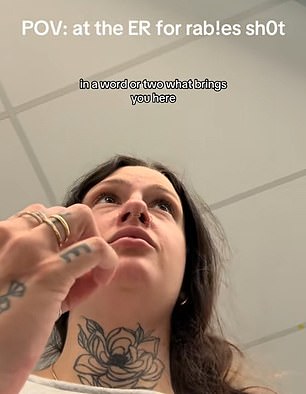[ad_1]
A woman was urged to rush to hospital for rabies shots after discovering a dead baby bat in her toilet—and then realising she had a mysterious scratch on her leg.
Alison Doyle, from Montréal, Canada, went viral after posting the grim find on TikTok, where her video has racked up more than 5.8 million views.
‘My day is ruined,’ she told her followers on her @tismpump_ page. ‘I went downstairs into the bathroom… There’s a baby bat. This the one time I need a man.’
The footage shows Alison lifting the toilet seat to reveal the tiny bat floating inside.
In a follow-up clip, she admitted she initially thought the creature might still be alive and considered rescuing it.
‘I tried to touch it to see if it was alive,’ she said. ‘I could feed it a little milk, we could go to the dollar store, get a little baby bottle… [but] she’s gone.’
Panicked, she called her mother, who told her to flush it—which she did.
But when a viewer commented that ‘all it takes is a scratch’ to get rabies, Alison revealed a fresh scrape on her leg.


In a viral TikTok videos she revealed she had to get rabies shots after finding the bat in her toilet (Image: Alison Doyle/@tismpump_)
The revelation sparked alarm in the comments, with hundreds urging her to seek urgent medical attention. Some even begged her to update them once she got to hospital.
Rabies is almost always fatal once symptoms appear—but can be prevented with prompt treatment after exposure.
But in another clip, she said: ‘I literally can’t go to Costco without having an autistic meltdown.
‘I frequently avoid going to the hospital because I live in Canada, so if you go to the ER, you’re there for 12 hours.’
One social media user commented: ‘I’m so sorry to tell you this bestie you must always go to urgent care and always assume you’ve been bitten if there’s a bat found indoors.’
In a subsequent clip, she did a ‘what’s in my bag hospital rabies edition’ after she finally decided to go to the emergency department.
She later published a video of her in an ‘autistic room’ for those who have a hard time being in hospitals.
Replying to a comment, she said, ‘apparently it could’ve been flying around the night before’ and bit or scratched her.
So, she explained: ‘Everyone on TikTok thought I should get a rabies shot and so did the people in the ER’.
The jab protects against rabies, a serious infection that’s usually caught from a bite or scratch of an infected animal.
Rabies is almost always fatal once symptoms set in—but early treatment with a vaccine can stop the virus in its tracks.
Symptoms include hallucinations, anxiety, being overly energetic, paralysis and numbness or tingling where you were bitten or scratched.
They usually take three to 12 weeks to appear, but they can appear after a few days or several months or years later.
In a follow up video, she said: ‘Apparently I have to come back to the hospital four times to get treated for rabies.’
Treatment usually involves two or more doses of the rabies vaccine, according to the UK’s National Health Service (NHS).
But there is also a medicine called immunoglobulin for those who have not had the vaccine before or have a weakened immune system.
‘The only reason why I don’t have rabies now for sure is because of the people of TikTok,’ she said once back home in an update.
Meanwhile, in another video, explaining what happened at the hospital in Canada, she said: ‘On the first day you get five shots.’
Then she explained she has to go back to the hospital for three more shots, bringing it to a total of eight injections.
It comes just months after UK health officials issued a warning after grandmother died from rabies.
Yvonne Ford, 59, from Barnsley, in England died in June after contracting the illness following contact with a stray dog.
She didn’t start developing symptoms until four months after returning home from her holiday in Morocco.
There have been less than 10 cases of human rabies associated with animal exposures abroad reported in the UK since 2000.
However, the UKHSA stressed there was ‘no risk to the wider public’ given there is ‘no documented evidence of rabies passing between people’.
[ad_2]
This article was originally published by a www.dailymail.co.uk . Read the Original article here. .

